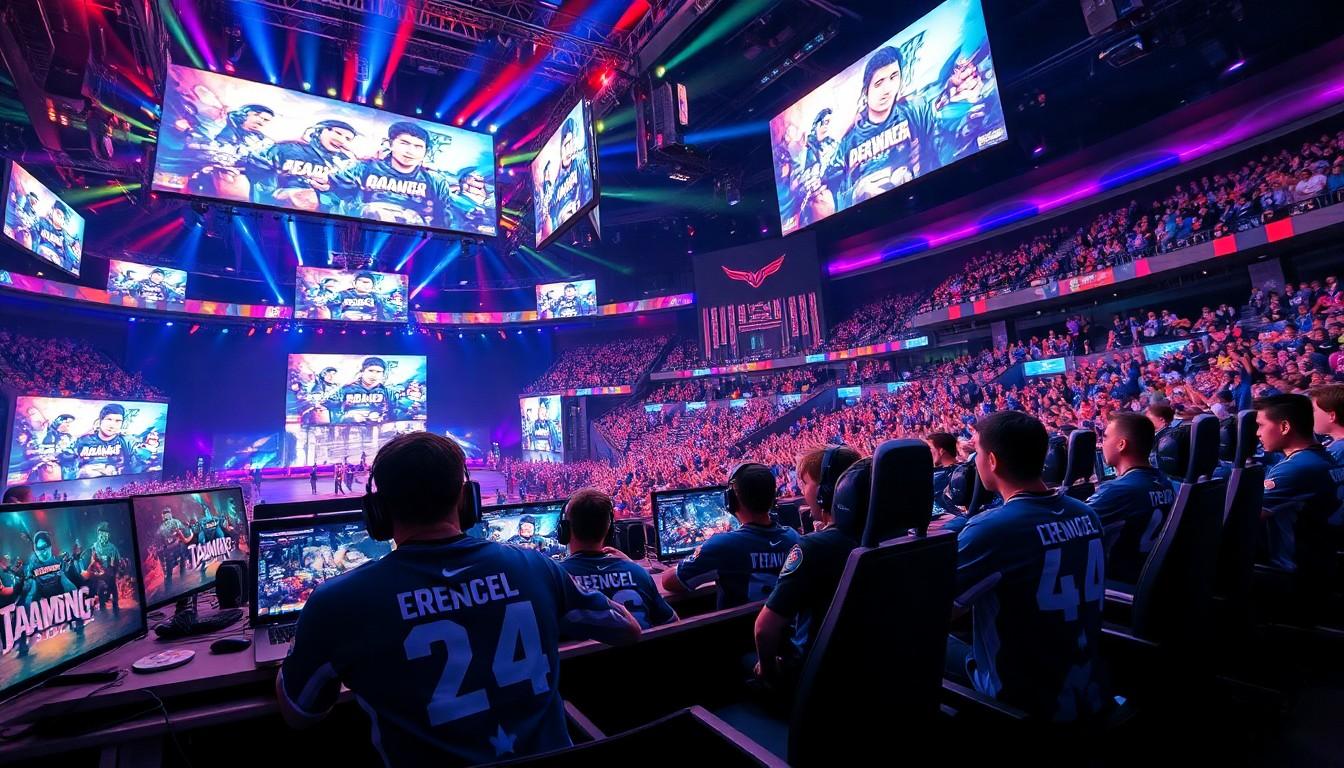In a world where gaming isn’t just a pastime but a full-blown industry, the esports business is leveling up faster than a pro gamer on a hot streak. With millions glued to their screens, cheering for their favorite teams, it’s clear that this isn’t just a hobby; it’s a lucrative arena where strategy meets spectacle.
From sponsorship deals that could make a football team envious to merchandise sales that rival the biggest brands, the esports landscape is a goldmine waiting to be explored. Whether you’re a seasoned investor or just curious about the pixelated phenomenon, understanding the dynamics of this booming business is essential. Buckle up, because the world of esports is not just about gaming; it’s about cashing in on the thrill of competition and community.
esports business
Esports has transformed into a significant segment of the entertainment and sports industries. This sector includes competitive gaming events, broadcasting, merchandise sales, and more.
Definition And Scope
Esports encompasses organized multiplayer video game competitions. Participants range from amateur players to professionals. Various genres exist, including first-person shooters, real-time strategy, and fighting games. The industry includes game developers, publishers, teams, and tournament organizers. Spectators contribute to its scope, as revenues arise from broadcasting rights and ticket sales. It represents a multi-faceted market employing numerous professionals, from event managers to marketing experts.
Growth And Popularity
Esports has experienced explosive growth in recent years. Research indicates that the global esports market is projected to reach $1.5 billion by 2023. Increasing viewer engagement fuels this rise, with millions tuning in to major tournaments. Platforms like Twitch and YouTube have popularized esports, providing venues for streaming live events. Sponsorships significantly bolster revenues, with brands seeking to connect with younger audiences. Additionally, university programs are incorporating esports, enhancing its legitimacy as a career option.
Key Players In The Esports Business

Understanding the key players in the esports business reveals the intricate relationships driving this thriving sector.
Game Developers
Game developers are vital to the esports ecosystem. They create the games that attract players and viewers alike, defining genres that shape competitive formats. Prominent companies like Riot Games and Blizzard Entertainment lead this sector, producing titles like League of Legends and Overwatch, which boast dedicated player bases and large tournaments. Developers often collaborate with organizations to enhance gameplay experiences and ensure the game’s longevity. Regular updates and expansions keep the community engaged, further driving professional interest. Consequently, the focus on esports helps developers gain revenue through in-game purchases and licensing deals.
Teams And Organizations
Teams and organizations play a crucial role in esports. Popular teams like Team Liquid and FaZe Clan not only attract skilled players but also develop strong brand identities. Organizations manage rosters, sponsor relationships, and marketing strategies, positioning themselves as influential members within the community. Competing in tournaments allows these teams to showcase their talent, generating revenue through prize winnings and merchandising. Sponsorship deals form a significant income source, as brands seek exposure to the youthful esports demographic. Community engagement and fan interaction are essential, as they foster loyalty and drive support for the teams, contributing to the industry’s overall growth.
Revenue Streams In Esports
Esports generates significant revenue through various channels. Understanding these streams showcases the industry’s extensive financial potential.
Sponsorships And Advertising
Sponsorships drive a substantial portion of revenue for esports organizations. Brands partner with teams to access target audiences, particularly younger demographics. Advertising opportunities arise during tournaments and live streams. Companies like Intel and Red Bull invest heavily in esports sponsorships, enhancing brand visibility. This collaboration benefits both parties, as brands gain exposure and teams receive much-needed funding. Advertising within game broadcasts and on platforms like Twitch directly engages millions of viewers. The rise of influencer marketing also plays a critical role, as players promote products to their fanbases. These partnerships create a symbiotic relationship, fueling the continual growth of the esports market.
Merchandise Sales
Merchandise sales contribute significantly to the revenues of esports teams and organizations. Fans eagerly purchase jerseys, hats, and accessories to support their favorite teams. Organizations leverage online platforms to maximize merchandise visibility and accessibility. Popular teams like Cloud9 and Team Liquid offer a range of branded products, fostering community loyalty. Seasonal events and limited-edition items generate excitement, leading to increased sales. Additionally, collaborations with fashion brands often enhance merchandise appeal. The focus on quality and design often draws in both gamers and non-gamers alike, broadening the customer base. Overall, merchandise sales represent a vital revenue source that complements the esports ecosystem.
Challenges Facing The Esports Business
Esports faces various challenges that can impact its growth and stability. Stakeholders must navigate these hurdles to ensure long-term success.
Regulatory Issues
Regulatory challenges present significant obstacles in the esports industry. Different countries exhibit varying levels of acceptance and regulation regarding competitive gaming, complicating international events. Some regions impose age restrictions or require specific licensing for tournaments. Moreover, the lack of a unified regulatory body makes compliance difficult for organizers and players. These complexities can hinder the fluidity of operations and limit sponsorship opportunities, as brands often seek stable, compliant environments. Monitoring evolving regulations remains essential for sustaining growth.
Financial Sustainability
Financial sustainability poses a critical challenge for many esports organizations. Revenue streams rely heavily on sponsorships and advertising, making them vulnerable to market fluctuations. Teams often face unpredictable earnings, especially smaller ones lacking significant backing. Additional challenges include balancing operational costs like salaries, equipment, and travel expenses. Maintaining profitability becomes even harder when teams invest in long-term player contracts, which may not yield immediate returns. Exploring diverse revenue models and innovative partnerships is crucial for achieving financial stability within the competitive landscape.
Future Trends In Esports Business
The esports industry is on the brink of significant transformation, driven by emerging technologies and global engagement.
Technological Innovations
Advancements in technology shape the future of gaming experiences. Virtual reality and augmented reality enhance player immersion, creating interactive environments. Cloud gaming platforms allow seamless access to popular titles, broadening audience reach. Additionally, artificial intelligence plays a crucial role in match analysis, enabling teams to refine their strategies. Gamers increasingly rely on data analytics for performance improvement, emphasizing the growing importance of technology in this sector. The integration of blockchain technology introduces new ownership models and monetization methods, altering how players and organizations manage assets.
Global Expansion
Esports experiences rapid global expansion, reaching unprecedented audiences. Markets in Asia, Europe, and North America contribute significantly to revenue generation. Countries like China and South Korea lead the way with established esports ecosystems, while emerging regions in Latin America and Africa show remarkable growth potential. Expanding partnerships with mainstream sports organizations enhance visibility and legitimacy within the sports world. In addition, localization efforts adapt games to diverse cultures, further attracting new players and viewers. Global tournament formats foster international competition, drawing attention from millions and elevating the status of esports worldwide.
entertainment and competition
The esports business stands at the forefront of a revolutionary shift in entertainment and competition. As it continues to evolve and attract substantial investments the potential for growth remains immense. With a diverse array of revenue streams and a passionate community driving engagement the industry is poised for further expansion.
Challenges do exist but the innovative spirit within esports keeps it resilient. Emerging technologies and global market dynamics promise to reshape how fans interact with their favorite games and players. As esports solidifies its place in the entertainment landscape it offers exciting opportunities for those willing to embrace its future.

